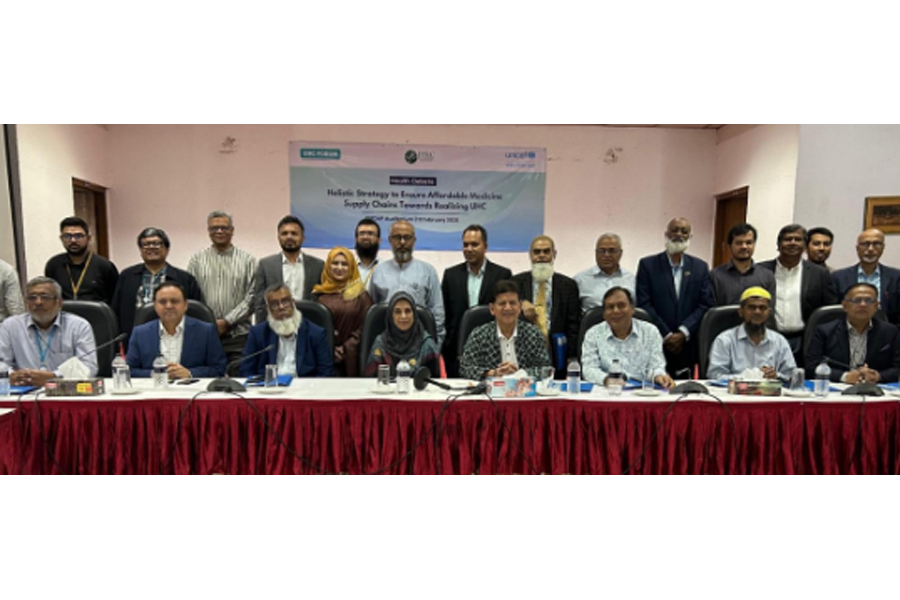Unethical promotional practices in pharma sector undermining country’s progress towards UHC

Published :
Updated :

Unethical promotional practices and systemic inefficiencies in Bangladesh’s pharmaceutical sector are making essential medicine unaffordable, undermining the country’s progress towards Universal Health Coverage (UHC).
While Bangladesh’s pharmaceutical industry meets 98 per cent of domestic medicine demand and exports to over 70 countries, concerns over pricing, regulatory oversight, and supply chain weaknesses persist. Experts argue that while cost-effective solutions are necessary, they should not come at the expense of quality or patient welfare.
These issues took centre stage at a debate on Thursday, titled “Holistic Strategy to Ensure Affordable Medicine Supply Chains Towards Realizing UHC” Organised by the Power and Participation Research Centre (PPRC) in partnership with the health advocacy platform UHC Forum and supported by UNICEF, the discussion brought together pharmaceutical industry leaders, regulatory authorities, public health experts, and policymakers.
Stakeholders also stressed the need for stronger regulatory enforcement, transparent pricing mechanisms, and ethical marketing practices to curb exploitative pricing and ensure fair access to life-saving medicines.
The debate, chaired and moderated by PPRC Chairman and UHC Forum Convener Hossain Zillur Rahman, highlighted critical gaps in procurement, supply chain management, and drug administration.
Experts also noted that medicine affordability remains a key challenge due to unregulated pricing, excessive promotional expenditures, and the lack of a structured pricing framework. Calls were made for updating the essential drug list, strengthening regulatory agencies like the Directorate General of Drug Administration (DGDA), and leveraging digital tracking systems to improve supply chain efficiency.
The discussion also underscored the ethical concerns surrounding the aggressive marketing of medicines, where pharmaceutical companies invest heavily in promotional activities rather than lowering production costs to benefit consumers.
Additionally, inefficiencies within regulatory bodies and supply chain entities such as the Essential Drugs Company Limited (EDCL) and the Central Medical Stores Depot (CMSD) have further exacerbated access issues.
Chaired and moderated by PPRC Chairman and UHC Forum Convener Hossain Zillur Rahman, the debate saw active participation from representatives of the Directorate General of Drug Administration (DGDA), pharmaceutical industry leaders, healthcare professionals, and supply chain experts.
Attendees included Professor Dr Liaquat Ali, Health Sector Reform Commission; Dr C Soloman, UNICEF; Md Abdus Salam Khan, Additional Secretary, MEFW; Ashraf Hossain, Director (Admin), Directorate General of Drug Administration (DGDA); Md Zahid Alam, Incepta; Md Abu Shah Jamal Molla, MSH; Khairul Anam, UNICEF; Dr Touhid Anwar, CMSD; Shishir Morol, Prothom Alo; Brig. Gen. Mahbubur Rahman Bhuiyan, Supply Chain Consultant, National Heart Foundation; Shaikat Kumar, Deputy Director, DGDA; Fida Mehran, UNICEF; Dr Mohibullah.
In his concluding remarks, Hossain Zillur Rahman stressed the importance of a better understanding of the cost drivers of medicine prices and where regulatory and supply chain deficits lie, including the role and efficiency of EDCL, CMSD, and DGDA.
Expanding the essential drug list and ensuring regulatory oversight over the pricing while fostering an efficient and competitive pharma industry and addressing prescription practices and patient literacy are priority actions that should come into reform focus, he added.
The key recommendations from the debate will be submitted to the Health Sector Reform Commission to drive informed policy interventions.
sajibur@gmail.com


 For all latest news, follow The Financial Express Google News channel.
For all latest news, follow The Financial Express Google News channel.